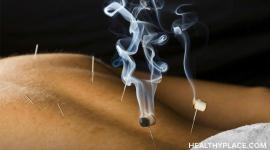Nutrition Therapy for Treating Alcoholism

Nutrition therapy, could it be the key to treating alcoholism? Learn about nutrition treatment for alcoholics and how it differs from traditional alcoholism treatment.
AA Meetings Weren't Enough
By the time Kathi Tuff finally discovered the treatment method that ended her dependence on alcohol, she'd been binge drinking for 23 of her 37 years and in and out of Alcoholics Anonymous (AA) for 13. "I remember being 15 and having guzzling contests with a group of guys at the local pizza joint and winning," says Tuff, who started drinking in the ninth grade. "I could drink anyone under the table."
Tuff first went into rehab in 1989 at the age of 24, but found recovery a series of false starts. "I'd binge for three weeks, then white-knuckle it. I always wanted to drink," she says. She fought depression, cravings, and constant emotional pain. AA meetings helped, but not enough.
"I was sober for ten years until 1999, when I really messed up," she says. The pain of a tough divorce weakened her resolve, and just after starting to date the man who is now her husband, Tuff went on a three-day bender. "Denny went out of town for the weekend and I just lost it. When he came back, he had to pick up the pieces."
Tuff's experience of relapsing after ten years of sobriety is more common than people might think. The shameful secret about modern alcoholism treatment is its abysmal long-term success rate. A commonly cited statistic for alcohol treatment programs nationwide is less than 20 percent recovery after one year. Think about it: That means that of every five people who enter an addiction program, only one will actually stay sober.
Luckily for Tuff, her husband-to-be was uniquely suited to help her. A recovering alcoholic himself, Denny Tuff is an alcoholism counselor and residential manager at Bridging the Gaps, a treatment program in Winchester, Virginia. Thanks to his 30 years of experience with recovering alcoholics, he knew there was a different approach that might work for Kathi. He insisted that she consult Charles Gant, a Washington, D.C.-based physician (now retired from practice) and author of End Your Addiction Now.
Gant is among a handful of mavericks who are convinced that the standard approach to alcoholism is missing an essential component: a biochemical way to loosen alcohol's grip. Their methods, which are slowly gaining acceptance, put a twist on the mind/body dynamic underlying traditional treatment programs.
Most such programs, with their emphasis on daily counseling sessions and attendance at AA meetings, focus on the mind. The 12 steps of AA couldn't be a more dramatic example of the belief that to control the body, you must first control the mind: "Admit that you are powerless over alcohol and that your life has become unmanageable," reads the first of the 12 steps. Another counsels taking "a searching and fearless moral inventory."
Alcoholism - A Biochemical Imbalance
 Gant and his colleagues believe that the body's needs must be attended to first. In their view, alcoholism is primarily a brain chemistry imbalance fueled by a deficiency in certain nutrients. A critical part of treating it, then, is to replenish those missing nutrients. Eating a diet high in protein, brain-healthy fats, and high-fiber carbohydrates, and taking supplements that include vitamins, minerals, and amino acids, they say, can actually rewire the brain to reduce cravings.
Gant and his colleagues believe that the body's needs must be attended to first. In their view, alcoholism is primarily a brain chemistry imbalance fueled by a deficiency in certain nutrients. A critical part of treating it, then, is to replenish those missing nutrients. Eating a diet high in protein, brain-healthy fats, and high-fiber carbohydrates, and taking supplements that include vitamins, minerals, and amino acids, they say, can actually rewire the brain to reduce cravings.
"We've accepted that alcoholism is a disease," Gant says. "Now we have to start treating it like one." The notion that alcoholism biochemical basis isn't brand new, of course. The first glimmerings came in the 1960s, and it was in 1990 that genetics researcher Kenneth Blum identified a gene that causes some people's brains to react differently to alcohol, setting the stage for addiction. Since then a vast body of research, much of it involving rats and mice, has documented alcohol's biochemical effects on the brain. We now know much more than we used to about why it's so terribly difficult for some alcoholics to get sober and stay that way.
"For the alcoholic, metabolism is far stronger than free will," says Amityville, New York, physician Joseph Beasley, an early proponent of research into the brain chemistry underlying addiction and the author of How to Defeat Alcoholism: Nutritional Guidelines for Getting Sober. "Diet and nutrition therapy should be part of any alcohol treatment program."
Yet most psychiatrists, counselors, and doctors in the field are woefully ignorant of the concept. "Alcoholism is a physical disease," says Joan Mathews Larson, a nutritionist who's the author of Seven Weeks to Sobriety and director of the influential Health Recovery Center, an outpatient treatment program headquartered in Minneapolis. "So treatment should offer more than just talk. It's like saying a person's diabetes can be turned around by 'taking a searching and fearless moral inventory'. Meanwhile, every organ in their body is collapsing." Larson, whose crusade to treat alcoholism with nutrition therapy was launched when her son committed suicide after completing a residential program, published a study showing that 74 percent of alcoholics who finished her program were still sober more than three years later.
It's not that those who advocate a nutritional approach think AA-based programs are entirely off-base. In fact, all the treatment programs that feature nutritional therapy also include either 12-step sessions or some other type of counseling. The point is that beating alcoholism requires shoring up the body as well as the mind.
How Nutritional Therapy for Alcoholism Works
The cornerstone of the Nutritional approach is to reduce the body's dependence on the simple carbohydrates that, like alcohol, convert quickly to sugar in the bloodstream: white bread, pasta, rice, and many baked goods. Relying on such refined carbs, nutritional advocates say, promotes the same blood sugar highs and lows that alcohol does, which can stoke the desire to drink.
What's more, alcoholics often respond to the steady infusion of sugar into their bodies by overproducing insulin, which then removes dangerously high amounts of sugar from the blood. Plummeting blood sugar, known as hypoglycemia, can lead to anxiety, irritability, and cravings—anything to get sugar, or, in this case, alcohol, back in the bloodstream.
The anti-alcohol diet emphasizes high-protein foods rich in amino acids. Substituting protein for simple carbohydrates helps break the vicious cycle of blood sugar cravings, and the amino acids are key to brain function. "We're giving the brain certain foods so it can make the natural chemicals we need to feel happy," says Julia Ross, who's the author of The Mood Cure and director of Recovery Systems in Mill Valley, California.
Alcohol, it seems, tamps down the body's ability to make neurotransmitters that affect mood. Chemicals produced when alcohol is metabolized are similar to the mood-lifters dopamine and serotonin; hence that giddy feeling we get with the first drink. This, along with the big boost of blood sugar, brings a temporary high.
But in the long term, an alcoholic's brain, fooled by the continual presence of feel-good chemicals from alcohol, shuts down production of its own. The result: depression, anxiety, mood swings, and the constant urge to drink to feel better.
Nutritional treatment aims to restore the body's natural supply of these chemicals. But everyone's metabolism is different, so the approach must be highly customized. Gant, for instance, uses blood tests to determine if a patient is primarily deficient in serotonin, dopamine, GABA, or endorphins.
Another key element of the recovery diet is fat, which many experts contend has been given an undeserved bad name. Beasley is a fan of olive oil, while Ross even touts butter and other foods containing saturated fat. Omega-3 fatty acids, found in fish like salmon and sardines are also favored. Fats are burned steadily over long periods of time, so they help keep blood sugar levels stable. And omega-3s are thought to boost levels of dopamine in the brain.
Certain supplements, too, are essential to the nutritional approach, though these must be tailored to a person's individual body chemistry. The amino acid glutamine is thought to be crucial for quelling cravings during alcohol withdrawal. Key neurotransmitter boosters include DLPA, which jump-starts endorphin production, and tyrosine, a mood-lifter. And most programs feature 5-HTP or prescription tryptophan, which help the body make serotonin. (See "The Recovery Diet," page 80, for more details.)
What does all this nutritional advice look like on a plate? A typical day would almost certainly start with eggs, perhaps in the form of a vegetable-rich omelet. Lunch and dinner are usually built around fish or chicken paired with vegetables, with some nuts and beans thrown in for good measure. Ross, Larson, Beasley, and Gant all have favorite foods—Ross calls them "good mood foods"—that they advocate eating as often as possible. Eggs, because they're high in protein and amino acids, are at the top of everyone's list, along with avocados, olive oil, almonds, and greens. And every person would also take his or her own mix of supplements.
A Major Difference Between Nutrition and Traditional Alcoholism Treatment
One last thing: These programs also require recovering alcoholics to give up all addictive substances, including caffeine and nicotine. Sugar is a no-no, too. This flies in the face of standard alcohol treatment, which holds that it's punishment enough for an alcoholic to give up booze, so if he or she needs other "crutches" to get by, so be it. (In fact, at many meetings in AA and 12-step based programs, there's a ready supply of candy and cookies.) Nope, say the nutrition experts, it all has to go.
"Sugar, caffeine, and nicotine are dangerous traps for the alcoholic," says Beasley bluntly. "You feel better for a little while, but then your energy level crashes and you feel worse. We have to get people off the roller coaster."
Jeff Underhill*, who lives in the San Francisco Bay Area, was on that roller coaster for years until he changed his diet six months ago. Following the plan in Julia Ross's The Mood Cure, he's eliminated sugar and white flour, substituting protein, vegetables, fish oils, and amino acid supplements. The new way of eating has definitely paid off: "I've lost the craving for alcohol," he says. "My wife still has a glass of wine at night and it actually smells repugnant to me—I don't have any desire for it." Even without the alcohol, he's finding it easier to cope with the stresses of his high-pressure job in technology.
If the nutritional approach to alcohol treatment is so promising, why isn't it more widespread? It's not like there isn't any research to back it up. Numerous studies comparing it to more traditional treatment have been undeniably impressive.
One, at a veterans' hospital in Waco, Texas, studied people who'd been hard-core alcoholics for up to 20 years. At the end of six months of nutritional treatment, 81 percent were still sober, compared with 38 percent of the control group. (Remember, the average recovery rate among standard treatment programs is only 20 percent.) In San Mateo, California, a pilot program treating alcoholics with amino acid supplements was also highly successful, with 73 percent of participants sober at the end of treatment.
"It works, and we've just got to get those in mainstream alcohol treatment to realize that it does," says Beasley.
The reasons it hasn't taken hold are many, says Julia Ross. Most addiction counselors come from a psychological rather than a physiological background, she says, and most doctors don't get much training in nutrition. A final deterrent is AA's abhorrence of anything that resembles "pill popping," which makes it difficult to sell a daily regimen of supplements.
There's also some skepticism on the part of mainstream experts about amino acid supplements in particular. Some endocrinologists argue that, when taken orally, they never make it past the blood-brain barrier and so have no effect. "It's called the placebo effect," says one endocrinologist drily. Other experts are on the fence, waiting for further research. Endocrinologist Anthony Karpas of Atlanta argues that the actions of certain amino acids, such as tryptophan, are well-known and that these remedies have real potential.
When it comes to viewing alcoholism as a brain chemistry problem, though, the tide of mainstream medical opinion is clearly turning. Last year the National Institutes of Health (NIH)'s Institute on Alcohol Abuse and Alcoholism announced a five-year initiative to study the brain chemistry that underlies alcoholism. The NIH has also held several workshops that included presentations on using fatty acids to treat alcoholism. Another encouraging development is the recent appointment of Nora Volkow as director of the National Institute on Drug Abuse; her research has helped establish the importance of dopamine in addiction. Taken together, these changes suggest that brain chemistry may finally be achieving its rightful place at the center of addiction research.
But these changes won't amount to much if nutrition doesn't make it into the mainstream alcohol treatment programs where the majority of alcoholics seek help. "We need to engineer this at the establishment level," Beasley says. "This is very good science that simply isn't being practiced."
Kathi Tuff is proof positive that nutritional treatment has the power to turn a life around. "I feel so much better than I've ever felt," she says. "I just wanted the alcohol out of my system— and to stop wanting it. Finally, it feels like that's happened."
Finding Help
If you or a loved one are seeking recovery and want to incorporate nutritional therapy into the plan, your best bet is to work with a specialist or enter one of the nutrition-based recovery programs around the country. That's because this approach is most effective when it's customized to your individual body chemistry; it's not recommended as a go-it-alone solution.
Some of these programs are residential; others are outpatient but provide housing for out-of-state clients. Still others offer long-distance counseling. Insurance coverage varies; check with your insurer to find out whether you're covered. Here's a list of the programs.
Nutritional Consulting Services
Connected Pathways
Karyn Hurley
888.847.4233
315.472.1476
www.connectedpathways.com
Recovery Systems
Julia Ross
415.383.3611, ext. 1
Residential Programs
Bridging the Gaps Treatment Program
423 W. Cork St.
Winchester, Virginia 22601
866.711.1234
540.535.1111
www.bridgingthegaps.com
Desert Canyon Treatment Center
Sedona, Arizona
888.811.8371
www.desert-canyon.com
Health Recovery Center
(two locations)
3255 Hennepin Ave. S.
Minneapolis, Minnesota 55408 612.827.7800
Health Recovery Center
50 S. Steele St., Suite 330
Denver, Colorado 80209
720.941.0442
866.244.8866
www.healthrecoverycenter.com
Lake Grove Treatment Centers of New York, Inc.
3390 Rte. 112
Medford, New York 11763
631.205.1950, ext. 222
Source: Alternative Medicine
APA Reference
Staff, H.
(2008, October 23). Nutrition Therapy for Treating Alcoholism, HealthyPlace. Retrieved
on 2025, December 7 from https://www.healthyplace.com/alternative-mental-health/addictions/nutrition-therapy-for-treating-alcoholism



